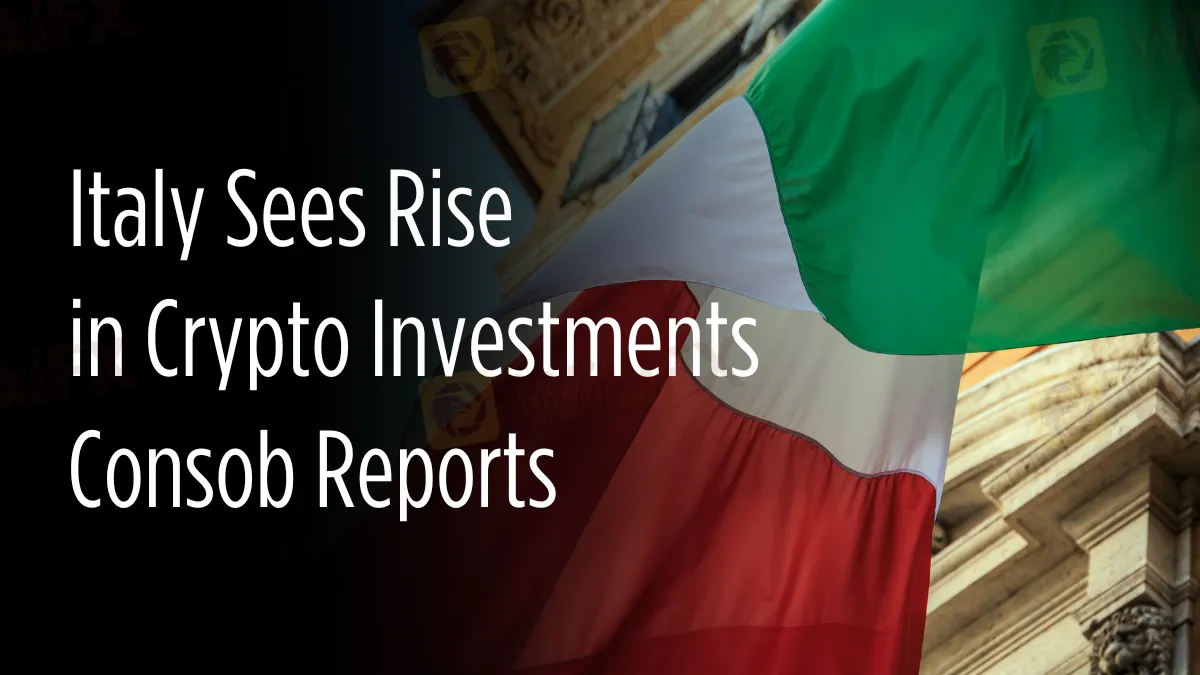简体中文
繁體中文
English
Pусский
日本語
ภาษาไทย
Tiếng Việt
Bahasa Indonesia
Español
हिन्दी
Filippiiniläinen
Français
Deutsch
Português
Türkçe
한국어
العربية
Italy Sees Rise in Crypto Investments, Consob Reports
Abstract:Italy's 2024 Consob report reveals a significant rise in crypto investments among families, highlighting a growing trend in digital assets and sustainability.

According to the most recent Consob investment data, cryptocurrency investments among households in Italy increased dramatically in 2024. Consob, the independent administrative institution monitoring Italy's financial markets, presented a study indicating a rising interest in digital assets as part of Italian investors' portfolios.
According to the 2024 Consob study, the number of respondents with cryptocurrency in their portfolios has more than quadrupled, from 8% in 2022 to 18% by the first quarter of 2024. This considerable growth indicates that cryptocurrencies are becoming a more important component of Italian investing strategy. Consob, on the other hand, warns that this spike looks to be a trend rather than the consequence of intelligent investment choices. Many investors still need a complete grasp of the features and hazards connected with digital assets.
Aside from cryptocurrency, the study emphasizes the substantial development in the sustainability sector. In 2024, 20% chose green investments, up from 11% in 2022. According to Consob's poll, advisers often assist these sustainable investment decisions linked to a medium to long-term investment horizon. This turn toward sustainability is consistent with a more significant trend of increased environmental concern among Italian investors.
The survey also emphasizes the longevity of classic investment products in Italian portfolios. Despite increased interest in cryptocurrencies and sustainable investing, Italians own various conventional financial products. Certificates of deposit, postal savings bonds, government bonds, mutual funds, and corporate bonds remain popular investment options. This varied investing strategy emphasizes balancing adopting new investment trends and sticking with traditional financial tactics.

The Consob study makes mention of the changing environment of financial information sources. Many Italians now rely on digital channels for their primary investing information. According to the research, 67% of respondents get investing information from the internet and web-based tools. Television is a substantial source (43%), but social media is also powerful, with 36% of respondents depending on these outlets. Notably, younger investors are more likely to utilize social media, with 58% of users aged 18 to 34.
Major industrial companies have also expressed support for the growth of the Bitcoin business in Italy. Binance, a top cryptocurrency exchange, has claimed a significant increase in the Italian sector in the first half of 2024. According to Binance Research's Half-Year Report 2024, the worldwide cryptocurrency market capitalization rose 37% in the first half. In Italy, Gianluigi Guida, CEO of Binance Italy, said that 2024 is shaping up to be a watershed moment for crypto asset maturation. Guida stressed that the year's second half will be critical for further developing and accepting cryptocurrencies in Italy.
Finally, the 2024 Consob research reveals a significant increase in cryptocurrency investments among Italian households, indicating a rising tendency toward digital assets. While conventional investments are still popular, there is a definite move toward sustainable investing options. The changing landscape of financial information sources and the growing presence of major crypto exchanges such as Binance highlight the dynamic character of Italy's investing climate. The further growth of crypto-assets will be essential to monitor in the Italian financial system this year.
Stay updated on Italy's rising crypto investments and sustainable finance trends from Consob's 2024 report. Learn more on WikiFX News

Disclaimer:
The views in this article only represent the author's personal views, and do not constitute investment advice on this platform. This platform does not guarantee the accuracy, completeness and timeliness of the information in the article, and will not be liable for any loss caused by the use of or reliance on the information in the article.
Read more

The Hidden Checklist: Five Unconventional Steps to Vet Your Broker
Forex broker scams continue to evolve, employing new tactics to appear credible and mislead unsuspecting traders. Identifying these fraudulent schemes requires vigilance and strategies beyond the usual advice. Here are five effective methods to help traders assess the legitimacy of a forex broker and avoid potential pitfalls.

Doo Financial Obtains Licenses in BVI and Cayman Islands
Doo Financial, a subsidiary of Singapore-based Doo Group, has expanded its regulatory footprint by securing new offshore licenses from the British Virgin Islands Financial Services Commission (BVI FSC) and the Cayman Islands Monetary Authority (CIMA).

CFI’s New Initiative Aims to Promote Transparency in Trading
A new programme has been launched by CFI to address the growing need for transparency and awareness in online trading. Named “Trading Transparency+: Empowering Awareness and Clarity in Trading,” the initiative seeks to combat misinformation and equip individuals with resources to evaluate whether trading aligns with their financial goals and circumstances.

Malaysian-Thai Fraud Syndicate Dismantled, Millions in Losses Reported
The Royal Malaysia Police (PDRM) has received 26 reports concerning the Nicshare and CommonApps investment schemes, both linked to a major fraudulent syndicate led by a Malaysian citizen. The syndicate’s activities came to light following the arrest of its leader by Thai authorities on 16 December.
WikiFX Broker
Latest News
ASIC Sues Binance Australia Derivatives for Misclassifying Retail Clients
Top 10 Trading Indicators Every Forex Trader Should Know
WikiFX Review: Is FxPro Reliable?
Malaysian-Thai Fraud Syndicate Dismantled, Millions in Losses Reported
Trading frauds topped the list of scams in India- Report Reveals
AIMS Broker Review
The Hidden Checklist: Five Unconventional Steps to Vet Your Broker
YAMARKETS' Jingle Bells Christmas Offer!
Revolut Leads UK Neobanks in the Digital Banking Revolution
Fusion Markets: Safe Choice or Scam to Avoid?
Currency Calculator


